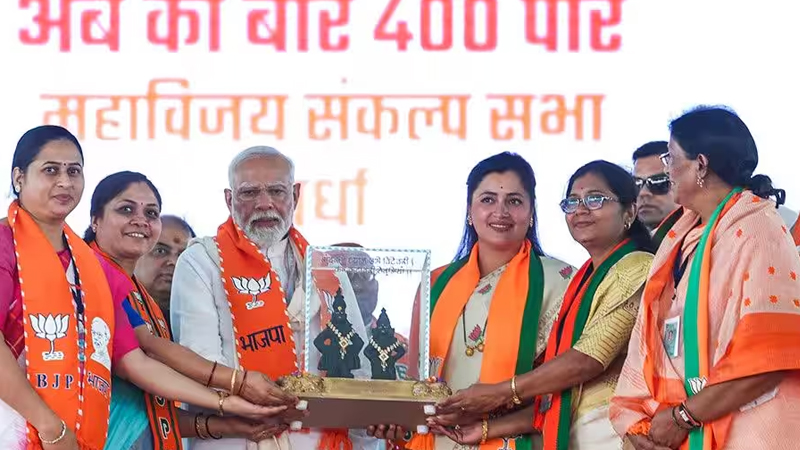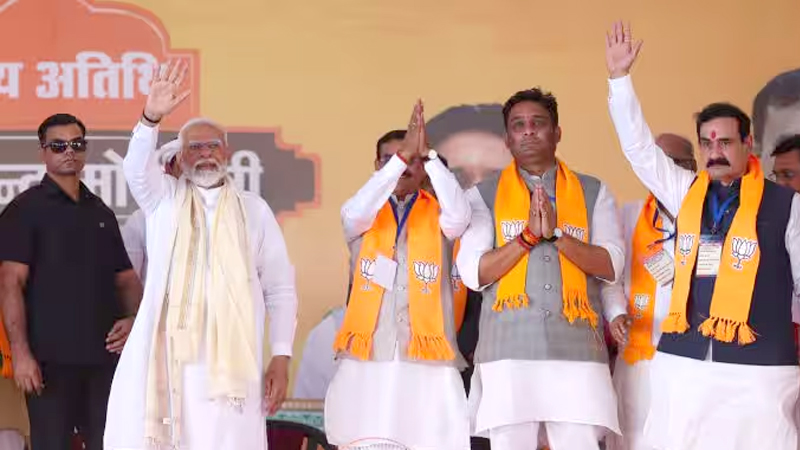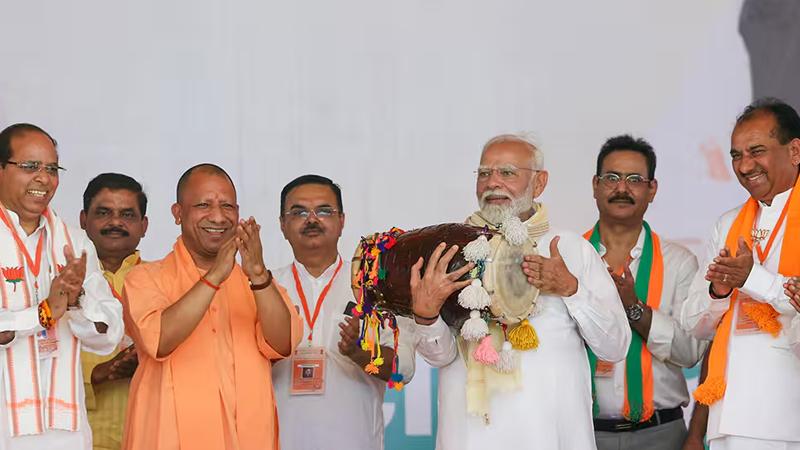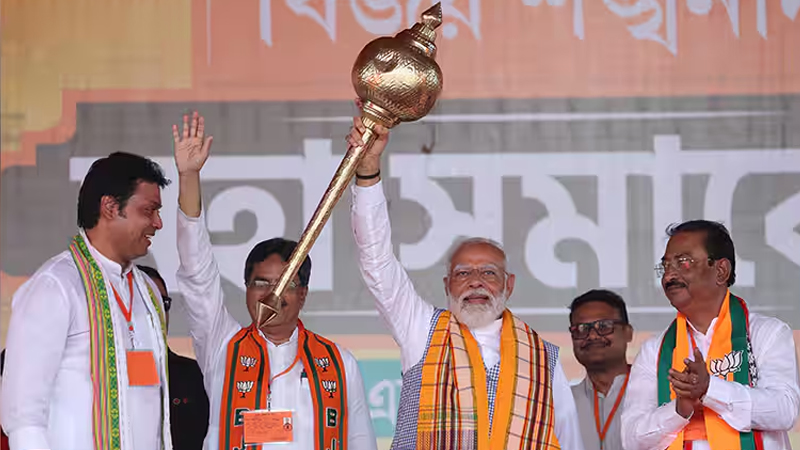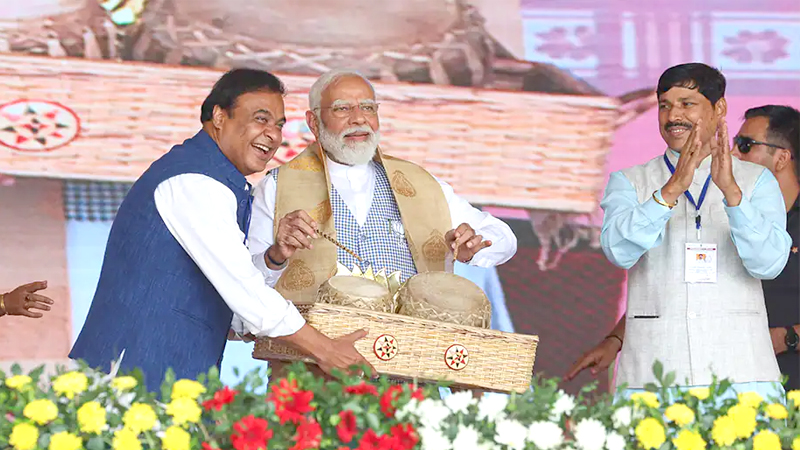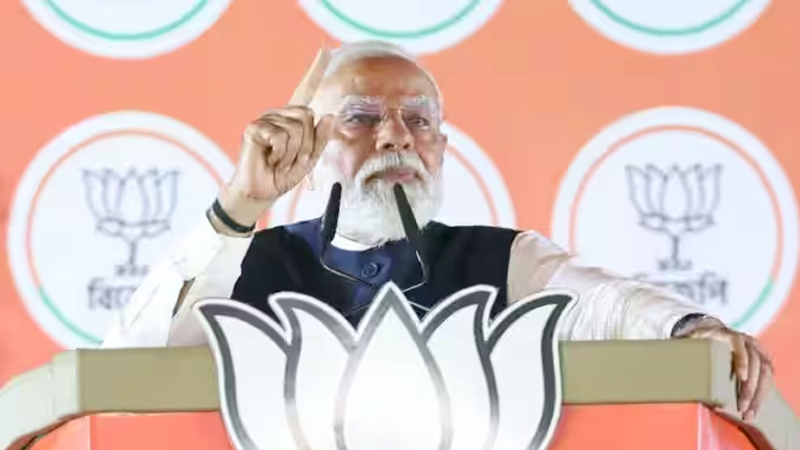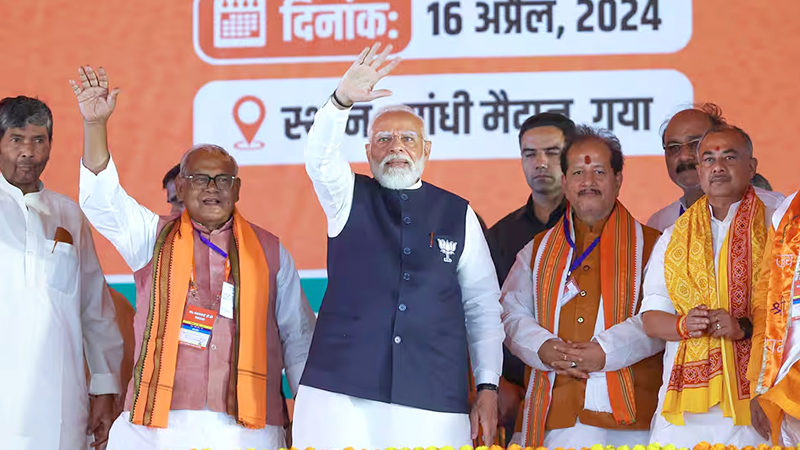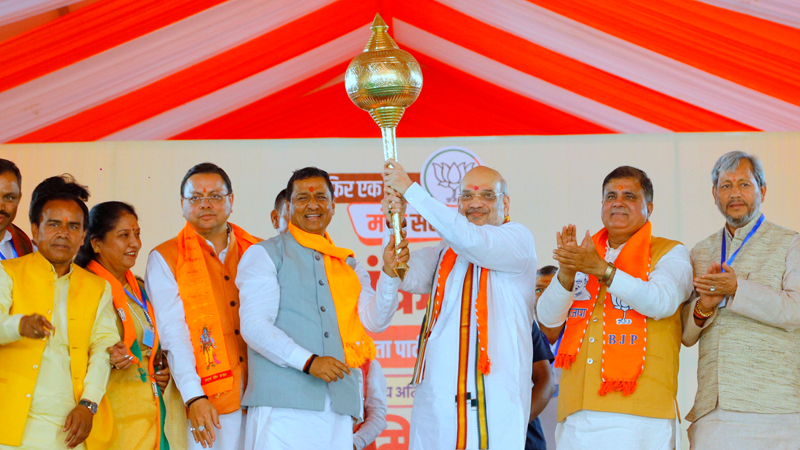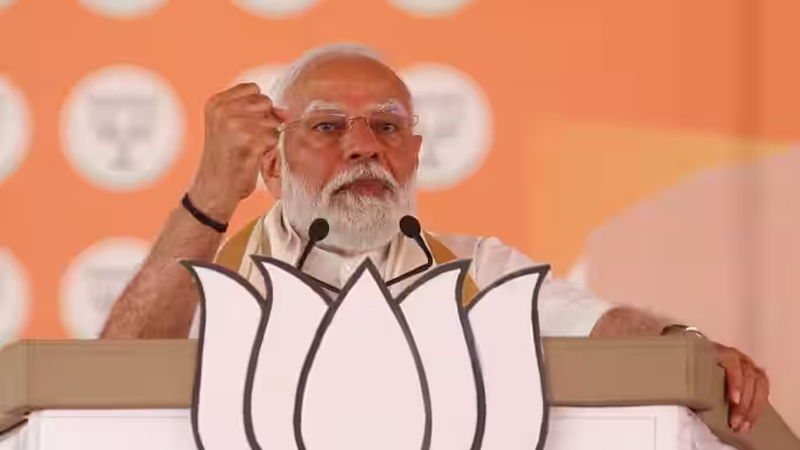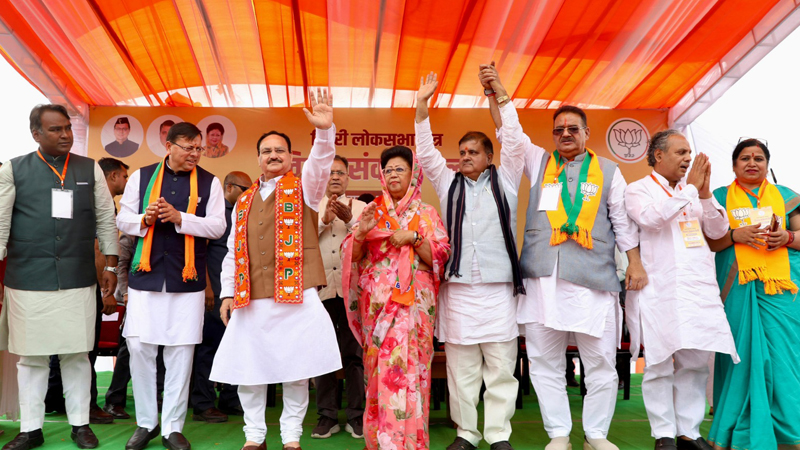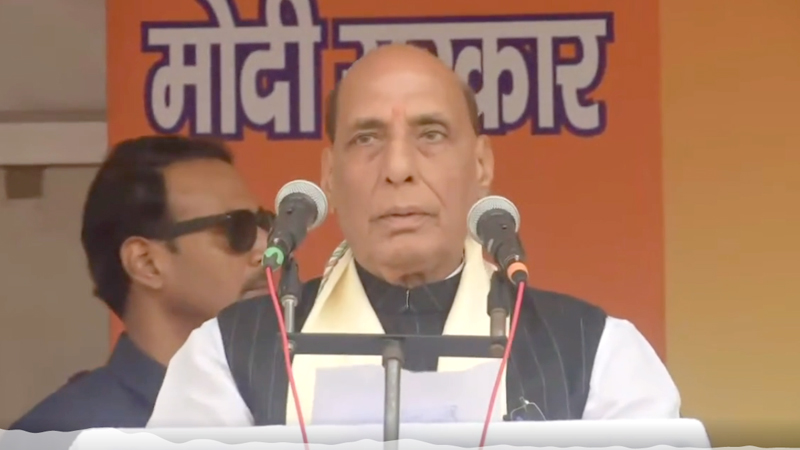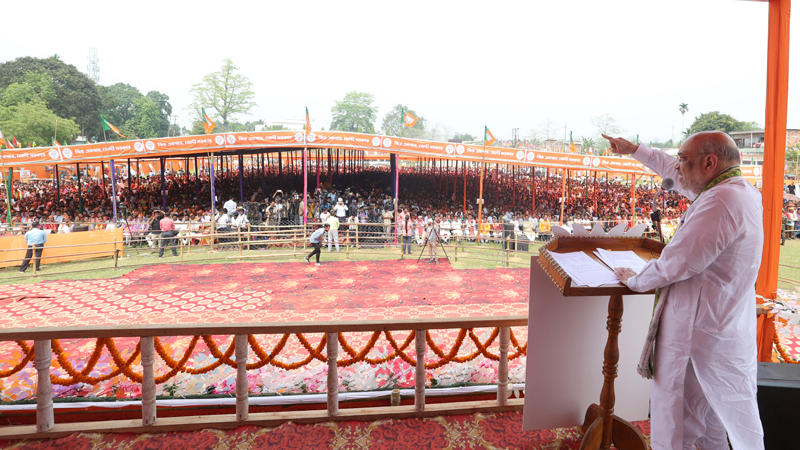Hon’ble Bharatiya Janata Party National President Shri Jagat Prakash Nadda addressed a public rally at Mussoorie, Uttarakhand on Monday. During the event, Uttarakhand Chief Minister Shri Pushkar Singh Dhami, BJP State President Shri Mahendra Bhatt, BJP Lok Sabha Candidate Smt Mala Rajya Laxmi Shah and other leaders were present. Shri Nadda stated that this election is about fulfilling the resolve of Hon’ble PM Shri Narendra Modi’s Viksit Bharat. In his address, Shri Jagat Prakash Nadda highlighted the achievements of the Modi government and reiterated the commitments made by the BJP for the development of the country. He praised various welfare schemes such as Ayushman Bharat, Ujjwala Yojana, and PM Gram Sadak Yojana, which have benefited millions of people across the country. Shri Nadda commended the development perspective of the BJP in contrast to the opacity of opposition parties.
Shri Nadda commenced his address by seeking the blessings of Baba Kedarnath and Badri Vishal Bhagwan, paying homage to the divine land and also paying respects to the martyrs who sacrificed their lives for Uttarakhand. Shri Nadda emphasized that it is our good fortune to witness the resolve of a Viksit Bharat under PM Shri Narendra Modi’s leadership. Shri Nadda noted that politics was laden with despair, with common people resigned to the belief that nothing would change ten years ago. Within ten years, PM Shri Modi has redefined the essence of politics, culture, governance, and the outlook towards politics. Shri Nadda emphasized that with the resolution of “Badalta Bharat, Badhta Bharat, Viksit Bharat” we are progressing forward. This commitment marks a departure from the skepticism of the past towards a proactive and optimistic approach to nation-building.
Hon’ble National President stated that he wanted to convey how under the leadership of Prime Minister Shri Narendra Modi, the country transformed and while COVID-19 hit the world, people in America couldn’t decide whether it’s about economy or humanity, Europe, Japan, Australia couldn’t determine if it’s about humanity or economy. Therefore, they kept wavering, but PM Shri Narendra Modi made a tough decision and imposed a strict lockdown. Within two months, the Prime Minister prepared the country to fight COVID-19, emphasizing “ jaan hai to jahan hai.” When the Indians were ready, the Prime Minister declared that jaan bhi hai, jahan bhi hai. Prime Minister Shri Narendra Modi set an example for the world on how a country with 1.4 billion people tackled the pandemic, changing the identity of evolving India. Shri Nadda mentioned that earlier, it took 25 to 28 years to bring tuberculosis medicine to India, 30 years for tetanus medicine, 29 years for diphtheria medicine, 35 years for leprosy medicine, and 100 years for jaundice medicine. The COVID vaccine arrived in 2020, and by January 20th, a task force was formed. Within nine months, not just one but two vaccines were developed, with 220 crore double doses administered, making India ready for the world’s largest vaccine program with the fastest vaccine.
Shri Nadda stated that when an individual from America arrives in Delhi, they show a paper certificate proving vaccination, while a person from India visiting America simply provides their mobile number. This is digital India, a transformed India. Previously, India used to seek medicine and vaccines from other countries, but today, India has provided COVID vaccines to a hundred countries as a gesture of friendship, offering free vaccines to 48 nations. Under the leadership of Prime Minister Shri Narendra Modi, the picture of rural India has changed. PM Shri Narendra Modi’s leadership has ensured schemes like the Garib Kalyan Ann Yojana reaching 80 crore people, providing Ujjwala gas connections, building toilets in villages under the Swachh Bharat Abhiyan, and offering free medical treatment to the poor under Ayushman Bharat. Shri Nadda revealed that under the Prime Minister Gram Sadak Yojana, nearly 3 lakh villages have been connected by roads. Shri Nadda stated that under the leadership of Prime Minister Shri Narendra Modi, every home now has water, and bathroom facilities are available in all households. This is the story of ‘Viksit Bharat’ and introduces the evolving face of India.
Hon’ble National President stated that today, 55 crore people have received free medical treatment up to Rs 5 lakh under the Ayushman Yojana, benefiting 40% of the population. In Sankalp Patra, it is promised that individuals above the age of 70, regardless of their category, will receive health coverage under the Ayushman Yojana. No government has ever shown concern for the transgender community, but Prime Minister Shri Narendra Modi has pledged in the sankalp patra to include the transgender community in the Ayushman Bharat scheme. The Ujjwala Yojana has empowered women, showcasing the changing India. Speaking about the soldiers, Shri Nadda mentioned that for 40 years, the One Rank One Pension issue was discussed, but no government listened. However, under the leadership of Prime Minister Shri Narendra Modi, approximately Rs 1 lakh crore has been spent on One Rank One Pension, with Rs 3,500 crore allocated to Uttarakhand and Rs 1.26 lakh crore distributed among 1.26 lakh servicemen. Shri Nadda highlighted that previously, army convoys would be stopped on roads, but in the changing India under the leadership of Prime Minister Shri Narendra Modi, in the past ten years, 13,525 km of double-lane, all-weather roads, and double bridges have been constructed in border areas. In Uttarakhand, 947 km of roads have been built in 22 projects, border roads are being constructed, and the work of advancing development is ongoing.
Shri Nadda stated that Prime Minister Shri Narendra Modi has placed Uttarakhand in the mainstream, increasing tax devolution fourfold for the people, and doubling the grant-in-aid in Uttarakhand. Shri Nadda mentioned that Prime Minister Shri Narendra Modi has redefined politics and changed the mindset of politics. Previously, the people of Uttarakhand used to say, “My village is the last village,” but Prime Minister Shri Narendra Modi said in Vibrant Village that it is not the last village but the first village of India. And 51 villages have been identified in Uttarakhand, where Rs 758 crore will be spent, and work will commence on 500 different projects.
Hon’ble National President elaborated on the ongoing development endeavors in Uttarakhand, citing the construction of the Char Dham roads, progress on the Karna Prayag rail project, and the successful reconstruction of Kedarnath. He also highlighted Mussoorie’s developmental work aimed at enhancing tourism. Notably, Uttarakhand took the pioneering step of implementing the Uniform Civil Code. Expressing his satisfaction, Shri Nadda commended Shri Pushkar Singh Dhami for integrating the Atal Bharat scheme with Ayushman Bharat, resulting in the issuance of 52 lakh cards. This initiative ensures that every individual in Uttarakhand receives an annual health cover of ₹5 lakh. Shri Nadda highlighted significant infrastructure projects, including the completion of the all-weather road in Tehri, the construction of a new terminal at Dehradun airport, and the inclusion of Dehradun in the Smart City initiative. Shri Nadda mentioned that under the Surya Yojna, solar energy production will occur in every household, leading to zero electricity bills. He emphasized that the PM Kisan Samman Nidhi and Pradhan Mantri Garib Kalyan Yojna will persist for the next five years.
Shri Nadda underscored that under the Pradhan Mantri Awas Yojna, 4 crore homes have been constructed, equipped with toilets, gas connections, and as outlined in the “Sankalp Patra,” it has been determined that an additional three crore homes will be built. Shri Nadda highlighted that previously, up to 4 lakh rupees were allocated to each panchayat for development, but now, under the BJP-led government, up to 4 crore rupees are being provided to each panchayat. Shri Nadda mentioned that the BJP’s Sankal Patra is synonymous with the NDA’s Sankal Patra, while other leaders such as Akhilesh Yadav from the Samajwadi Party, Rahul Gandhi from the Congress, Lalu Yadav from the RJD, and Stalin from the DMK have their separate Sankalp Patras. This raises the question of how development can occur if there isn’t even a commitment to unity among themselves. Shri Nadda pointed out that the Indi alliance is a corrupt coalition. Shri Narendra Modi says “Bhrashtachar Hatao“, while the Indi alliance advocates for “Bhrashtachar Bachao“. Shri Modi has announced that there will be swift action against corrupt individuals after June 4th, and no one will be spared. Furthermore,Shri Nadda highlighted that the INDI alliance is not concerned with Uttarakhand’s development; they only prioritize their own family’s interests.
Hon’ble National President highlighted that the Congress party was involved in various scandals, including the coal scam, 3G scam, 2G scam, Commonwealth Games scam, Submarine scam, and the Agustawestland helicopter scam. He emphasized that the Congress party engaged in corruption across all spheres neither sparing space, nor the skies, nor the earth, nor even the underworld. Shri Nadda highlighted that within the INDI alliance, politicians allegedly involved in corruption have united. This includes Samajwadi Party leader Akhilesh Yadav, implicated in cases related to the Gomti Riverfront project, food grain scam, and the laptop distribution scandal. RJD leader Lalu Yadav is also embroiled in cases involving land exchange for jobs and the fodder scam. Additionally, allegations of a scandal amounting to ₹1,34,000 crore have been leveled against Stalin. Shri Nadda highlighted that the political parties associated with the INDI alliance are Dynastic Parties including Congress Party, RJD, J&K National Conference Party, Mehbooba Mufti’s J&K’s People’s Democratic Party, Samajwadi Party and TMC. Shri Nadda emphasized that Congress leaders such as Rahul Gandhi, Sonia Gandhi, P. Chidambaram, and Karti Chidambaram, along with DMK leaders, TMC leaders, and AAP leader Sanjay Singh, are currently out on bail. Meanwhile, Delhi CM Arvind Kejriwal, AAP leaders Manish Sisodia and Satyendra Kumar Jain, along with Azam Khan, are in jail. Shri Nadda pointed out that half of the leaders in the INDI alliance are currently out on bail, while the other half are behind bars.
Shri Nadda mentioned that nowadays, there’s a growing trend of newcomers entering politics just to contest elections. Politics is about serving the people, not about personal gains. Therefore, under the leadership of Hon’ble PM Shri Narendra Modi, the BJP aims to fulfill the goals of “Fir Ek Baar Modi Sarkar” and “Abki Baar 400 Paar.” Shri Nadda emphasized that according to Shri Narendra Modi, the upcoming decade is committed to Uttarakhand’s development.






